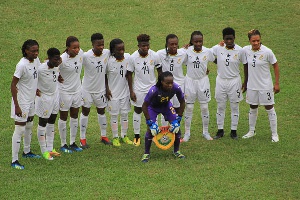 The Black Queens exited the tournament with 4 points from 3 games
The Black Queens exited the tournament with 4 points from 3 games
It has been a cornucopia of women's football for Ghanaians this month, and it has illustrated why there should be hope, but also caution, for the sport in the African country.
In Uruguay at the U-17 World Cup, the Ghana team did what a lot of the country's youth teams do: Dazzle and win over fans early on, but ultimately come unstuck at the big hurdles. Against Mexico, they lost on penalties in the quarterfinals.
The Black Maidens were in great form, winning all three group matches, before Mexico exploited a weakness in their goalkeeping, and a national distaste for penalties, to knock them out.
Led by the outstanding Mukarama Abdoulai, the Ghanaian teens scored 11 goals in four matches. Mukarama bagged seven of them. And they played a brand of football that has led to declarations of hope among many Ghanaian football fans.
High hopes from thrilling displays by youth teams are nothing new in Ghana. Just before the Maidens' campaign came to an end in Uruguay, there was evidence in Accra about the need to take it easy with the predictions. Evidence mounted about how that promise rarely translates to the senior side.
The senior team, the Black Queens, struggled to impose themselves on the Africa Women Cup of Nations, which the country is hosting. With a side dominated by players who came through successive U-17 sides since their semifinal finish at the World Cup in 2012, Ghana stuttered to an exit at the group stage.
The Black Queens beat Algeria 1-0 in the opening game, then lost the second game to Mali 2-1. The Queens then gave away the lead to draw 1-1 against Cameroon to exit the competition.
That exit means there will be no FIFA Women's World Cup for Ghana in 2019, prolonging their absence from the biggest level of the game to eight years over three tournaments. Ironically, they have never missed a youth level World Cup.
In many ways, the Black Queens' poor preparations caught up with them at home, and the reaction to those games exposed the general mindset towards women's football in the country.
In attempting to defend his players, Black Queens coach Bashir Hayford used words that have been heavily criticized since.
"I want to have my girls relax, have a peaceful mind," he said in the post match press conference. "I don't want to bombard them with accusations because they are not like men.
"Men are so accommodative and can easily tolerate [criticism]. Women don't tolerate these things so much. If you don't take care, you worsen the situation."
Hayford was not the only high profile coach to suggest a patronising approach to the Black Queens. Former Ghana U-17 and U-23 coach David Duncan courted a Twitter storm when he asked for fans to go easy on goalkeeper Patricia Mantey after her error gifted Mali their second goal.
"This is a man's game, no matter what," he tweeted. "Women football should always be purely for amusement. For the men it's always two-edged: amusement and business. So please go easy on the ladies."
Vice President of the Ghana Football Association's Normalization Committee, Lucy Quist, was outraged by the coaches' comments and responded with tweets of her own: "I have heard some disgusting things said about our Black Queens, some even right in the stadium.
"Losing a match is not cause for such vulgarity. Shame on everyone who looked upon OUR young women and spoke such words.
"And no, women are not playthings and their game is not just for amusement. If you can't see the vision of the power of football has to transform lives, if used positively, then please don't bother with your contribution."
Those commentaries by two of the biggest coaches in the country mirror the national attitude from many stakeholders in the women's game. And there has been ample evidence of that during the AWCON in Ghana.
The build up to the tournament, both for the team and in terms of promotion, was almost non-existent. While the men's side, the Black Stars, prepare for every Africa Cup of Nations in the best settings in Dubai and South Africa, the Queens stayed local, at the Ghanaman Soccer School of Excellence.
As the tournament has gone on, now at the semifinal stage, fans have struggled for information about things as basic as where to buy match tickets.
Still, there was a sense from the way the Maidens played in Uruguay that things will improve and attitudes will change. The past few week has exposed a lot of the prejudice against women football in Ghana, but there has also been been enough interest and talent to build on for the future.